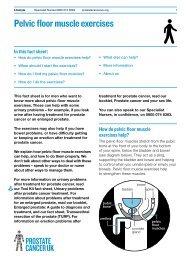Cryotherapy - Prostate Cancer Charity
Cryotherapy - Prostate Cancer Charity
Cryotherapy - Prostate Cancer Charity
Create successful ePaper yourself
Turn your PDF publications into a flip-book with our unique Google optimized e-Paper software.
Treatment Specialist Nurses 0800 074 8383 prostatecanceruk.org<br />
4<br />
When you have your catheter removed at the<br />
hospital it may be uncomfortable, but it should<br />
not be painful. You will need to stay for a few<br />
hours after the catheter has come out to check<br />
that you can pass urine without difficulty. You may<br />
wish to take some spare underwear and spare<br />
pair of trousers with you. In some centres your<br />
doctor or nurse may arrange for you to have your<br />
catheter removed at home.<br />
You may see some blood in your urine, both while<br />
the catheter is in and after it has come out. This<br />
is normal, and you should drink plenty of fluids to<br />
help clear the blood. If you are worried about it at<br />
all, contact your doctor or nurse for advice.<br />
You may also have some bruising and swelling of<br />
the skin around the testicles (scrotum), buttocks<br />
and inner thigh in the few weeks after the<br />
procedure. Your doctor or nurse may advise you<br />
to avoid long periods of standing for the first few<br />
weeks. You should be able to go back to your<br />
day-to-day activities as soon as you feel able<br />
to, although it may take a few weeks or months<br />
before you feel back to normal.<br />
What happens afterwards<br />
You will have follow-up appointments with your<br />
doctor or nurse at the hospital to check your<br />
recovery and monitor your response to the<br />
treatment. Your prostate specific antigen (PSA)<br />
level will be monitored regularly to help check<br />
how well the treatment has worked. How often<br />
will vary depending on the treatment centre, but<br />
you should have a PSA test about every three<br />
months for at least the first year, and every six<br />
months after that. You can ask your doctor or<br />
nurse how often you will have a test.<br />
If you had cryotherapy as a first treatment and<br />
your cancer starts to grow again, you may be<br />
able to have more cryotherapy. In some cases<br />
you may be offered radiotherapy or, rarely,<br />
surgery. If you had cryotherapy as a second<br />
treatment and your cancer starts to grow again,<br />
you will be offered hormone therapy.<br />
You can find more information about treatment<br />
options after cancer has come back in our<br />
booklet, Recurrent prostate cancer: A guide<br />
to treatment and support or you can call our<br />
Specialist Nurses on our confidential helpline.<br />
What are the side effects<br />
Like all treatments, cryotherapy can cause<br />
side effects. <strong>Cryotherapy</strong> will affect each man<br />
differently, and you may not get all of the side<br />
effects. The most common side effects include<br />
erection problems (see below) and urinary<br />
problems (see page 5).<br />
Many of the side effects of the treatment<br />
are caused when healthy tissues are frozen<br />
and damaged. There is a greater risk of side<br />
effects if you have already had radiotherapy or<br />
brachytherapy to treat prostate cancer. This is<br />
because these treatments may have already<br />
caused some damage to the tissues surrounding<br />
the prostate gland.<br />
Short term side effects<br />
Short term side effects include:<br />
• blood in the urine (haematuria)<br />
• difficulty or discomfort passing urine<br />
• bruising and swelling of the penis, skin<br />
around the testicles (scrotum), inner thigh<br />
and the area between your testicles<br />
and back passage (perineum), or<br />
• pain and bleeding where the needles<br />
were inserted.<br />
Mid or long term side effects<br />
Erectile dysfunction<br />
The most common long term side effect is<br />
difficulty getting or keeping an erection<br />
(erectile dysfunction). This is because the nerves<br />
responsible for erections can be damaged by<br />
the treatment. More than three quarters of<br />
men (over 75 per cent) will be unable to get an<br />
erection following cryotherapy. If sex is important to<br />
you, you should discuss with your doctor or nurse<br />
whether cryotherapy is a suitable treatment for you.<br />
Some men will find that they gradually get<br />
back their erections but for most men this is likely<br />
to be a long term problem. We do not know for










